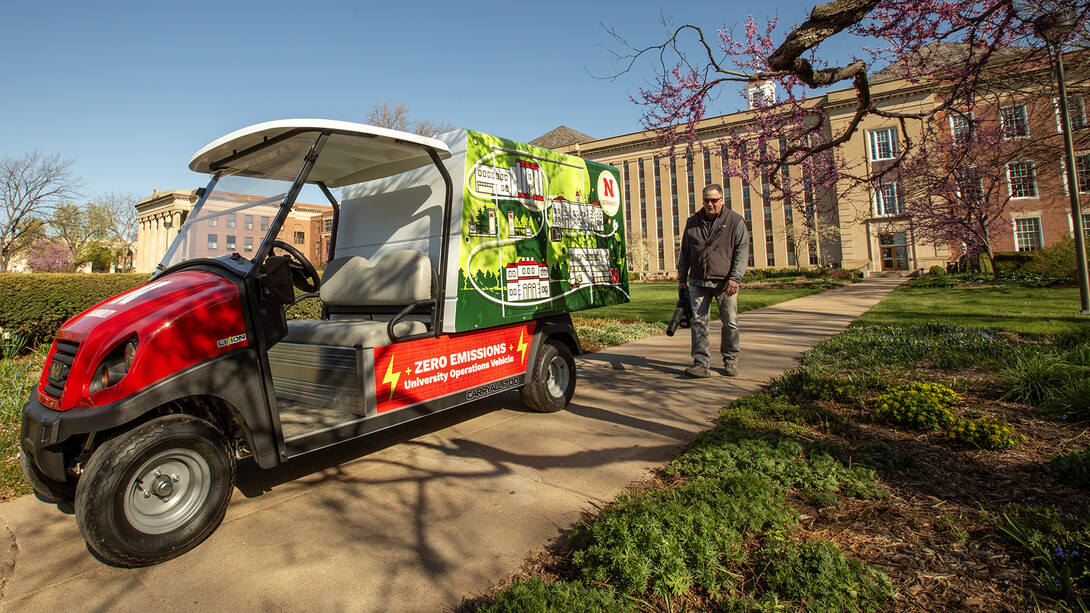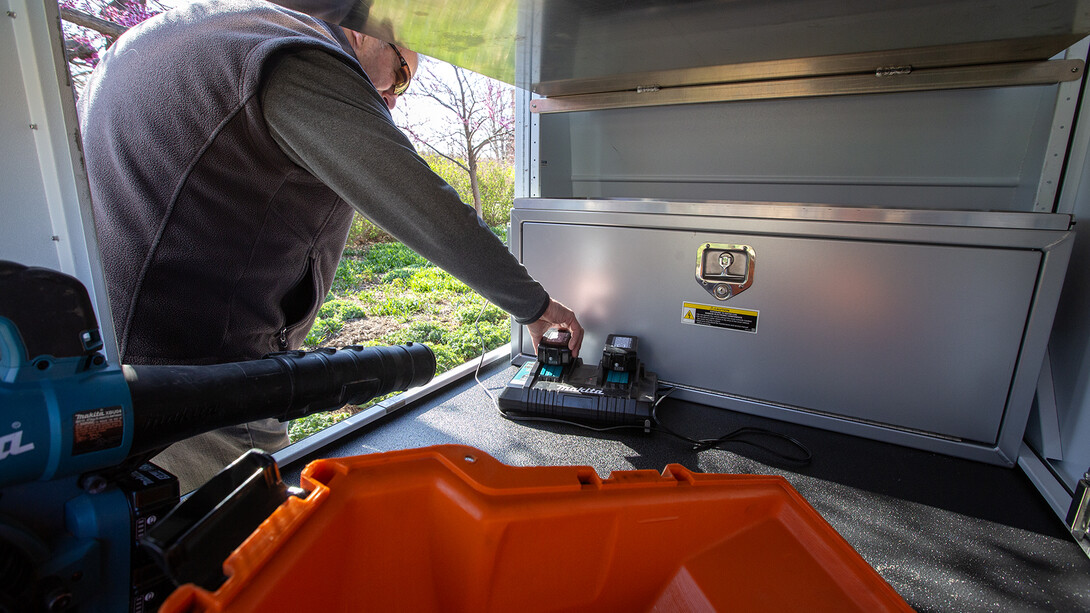
The Landscape Services team at the University of Nebraska–Lincoln is going greener this spring.
In collaboration with Club Car — a Georgia-based leader in manufacturing golf carts and small utility vehicles — the team developed a one-of-a-kind electric vehicle to expand the use of battery-operated equipment on campus. When it rolls out in the coming weeks, the vehicle will help cut greenhouse gas emissions by an estimated 83% compared to a traditional gas- or diesel-powered utility vehicle. It will also reduce classroom disruptions by minimizing the noise from tools like weed whips and leaf blowers, and improve efficiency by allowing workers to charge equipment batteries as they go.
“As part of our ongoing sustainability efforts, we’ve been using electric equipment for a number of years, but this new vehicle marks a significant leap forward,” said Jeff Culbertson, director of landscape operations. “It positions the university as a leader in sustainable practices and innovation in our field. More importantly, it will help improve the campus environment overall.”

Innovative Collaboration
The idea for the vehicle grew from a trade show attended by Jim Jackson, associate vice chancellor for university operations, and Gabe Hampton, director of building systems maintenance.
Jackson had been working with Culbertson to increase the use of battery-powered equipment to reduce noise when operating near academic buildings. A conversation with a Club Car representative led to the idea of pairing an electric vehicle with charging capabilities for campus landscaping gear.
“It dawned on me that we could set up one of these electric vehicles with a charging station and outfit it with all of our battery-powered tools,” Jackson said. “It felt like a perfect opportunity to reduce noise and emissions, fostering a quieter learning environment and enhancing sustainability on campus.”
After connecting with Club Car’s Custom Solutions Team, development of the vehicle took about nine months. The overall cost was less than a gas- or diesel-powered utility vehicle, and will reduce fuel costs over time. Features include a battery system projected to last up to three days on a single charge, as well as an onboard charging station that powers equipment like leaf blowers, trimmers, and even sound systems used for campus events. It will also help power poppers for the Student Life Popcorn Pop-Up event, 3 to 4 p.m. April 17 at the Nebraska Union.
Jackson noted that the success of the build was possible due to support from campus leadership.
“We strive to be responsible stewards of our resources, always looking for more efficient ways to run our operation while maintaining our high standards,” Jackson said. “Campus leaders have supported this mission, as it’s the smart choice for our university community and the state of Nebraska.”
As part of our ongoing sustainability efforts, we’ve been using electric equipment for a number of years, but this new vehicle marks a significant leap forward. It positions the university as a leader in sustainable practices and innovation in our field. More importantly, it will help improve the campus environment overall.
Greener Future
As battery technology has improved in recent years, Landscape Services has steadily increased the number of electric tools it uses. This mirrors trends seen across the landscaping industry and among consumers nationwide.
“The transition to electric equipment has been gradual,” Jackson said. “Initially, battery life and power didn’t match the demands of our crews. But today, our electric tools last as long as their gas counterparts and, mostly, deliver the same level of power. More importantly, they’re easier to maintain and much quieter to operate.”
Culbertson highlighted how the growing use of electric tools — including edgers, trimmers, chainsaws, and blowers — aligns with the university’s commitment to sustainability.
“It’s part of our ongoing effort to be responsible stewards of the environment and provide a better campus experience for everyone,” Culbertson said.
The team plans to evaluate the new Club Car in the coming months. If the results are positive, they aim to purchase more electric vehicles as gas-powered models need to be replaced.
This effort reinforces the University of Nebraska–Lincoln's commitment to sustainability, which has been demonstrated through collaborative efforts across campus. Recent successes include standardizing recycling on campus through the All in the Hall program, reducing waste in dining facilities, and efficiently operating and maintaining buildings on campus. Most recently, the university was selected as one of 21 pioneering institutions nationwide to participate in the development of a new Carnegie Elective Classification focused on sustainability. Learn more about sustainability on campus.







